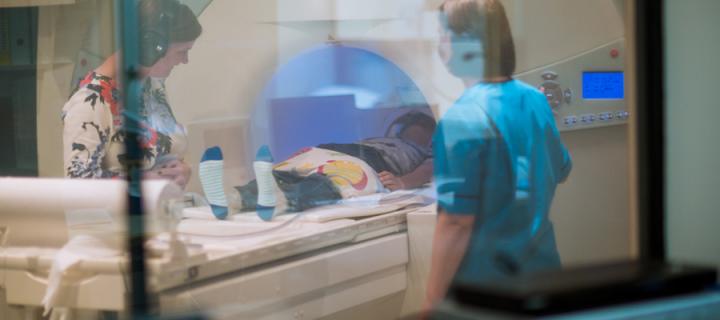Neuroscience
Our researchers study the brain from birth to old age. Find out what we’re doing to understand this vital organ and improve people’s lives when it fails to work as it should.

The human brain, weighing in at an average of 1,500g, is the body’s third largest organ and the command centre for our whole nervous centre, responsible for how we think, feel and react. Yet despite its size and importance, it’s arguably the least understood human organ sometimes referred to as ‘the final frontier of medicine.’
Our Edinburgh Neuroscience group is one of the largest of its type in Europe, drawing together clinical, biomedical, informatics and psychology research to explore unanswered questions about how this organ operates. Researchers at Edinburgh study the brain from birth through adulthood to old age. We’re seeking to grow our understanding of the how the brain works and what causes complex conditions alongside developing new therapies and treatments.
What we're doing
Much of our work in this area has been supported generously by philanthropy. This support has enabled us to establish or strengthen research dedicated to finding better therapies to improve the lives of people living with neurological disorders and treatments or cures for degenerative conditions.
Here’s an overview of some of the work we are doing and how you can contribute to research in this field.
Researchers at our Jennifer Brown Research Laboratory focus on investigating the links between pregnancy complications, such as preterm birth, poor foetal growth, and some maternal medical disorders such as abnormal brain development in children. Any disturbances to brain development can have a lasting impact on children and their families, potentially limiting the life chances of people living with these brain abnormalities.
Clinical and Pre-Clinical research teams at our Muir Maxwell Epilepsy Centre are investigating the causes of childhood epilepsy and using their findings to inform new treatments and public health strategies.
The Salvesen Mindroom Research Centre works in partnership with the Scottish charity the Salvesen Mindroom Centre to generate new knowledge about learning difficulties. Knowledge that can help design and evaluate ways to enable people to thrive.
We’re doing important work to learn more about autism and other intellectual disabilities. Researchers at the Patrick Wild Centre are working to understand more about and test new therapies for autism spectrum disorder (ASD), fragile x syndrome (FXS) and intellectual disabilities (ID). Its sister centre, the Simons Initiative for the Developing Brain, is focused on discovering the biological mechanisms underlying autism.
Support the Patrick Wild Centre
Find out more about the Simons Initiative for the Developing Brain
Edinburgh hosts two leading research centres working to improve the lives of people living with degenerative conditions affecting the brain. At the Anne Rowling Regenerative Neurology Clinic, staff are delivering drug trials, making discoveries and identifying ways to improve the quality of life for people living with neurological conditions including MS, MND, Parkinson’s and early onset dementia.
The Euan Macdonald Centre for Motor Neurone Disease is focused on helping people living with MND and associated conditions, through a programme of research, training, support and awareness raising.
At our Row Fogo Centre for Research in Ageing and the Brain, researchers want to improve understanding of Small Vessel Diseases (SVD). SVDs are recognised to be a major cause of age-related brain diseases, such as stroke, Alzheimer’s disease, and dementia, yet there is very little understanding of this disease. Our researchers want to change this.
Support our efforts in neuroscience
If you are inspired by our work to improve understanding of the brain and help people living with neurological conditions, there are a number of ways in which you can get involved.
Find out how a gift in your will can support neuroscience research.
Get in touch
Get in touch to have a conversation about what we're doing and how you can help.

